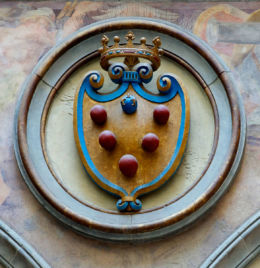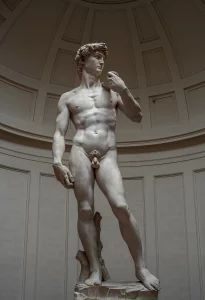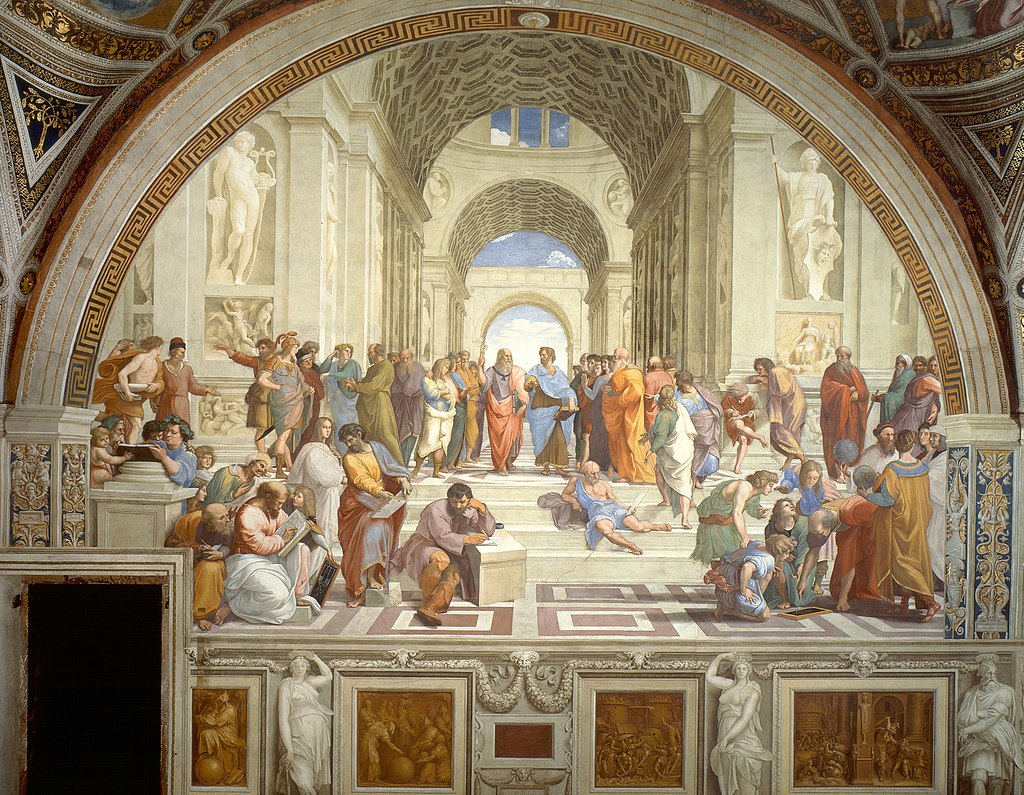843 words
Modern historians credit the Dark Ages as a time of steady progress, but no one is lobbying to rename that period the Age of Light. Our race produces geniuses daily, yet there is an almost complete absence of any written record for 500 years. Nothing like a great writer, artist, or biography is recorded from this time.
Call me a reactionary, but I place more stock in the opinions of Petrarch and Gibbon than the hacks in the academy do today. Unlike them, we don’t see Western civilization as merely an academic subject. It is not a cold cadaver to dissect and analyze. It is our people’s past, and therefore it is deeply personal. Our forebearers’ spectacular art, beautiful music, and vivid histories give us meaning and purpose.
It is vital these feelings should be cultivated in every person of European descent. Only through a sense of personal ownership can we hope to preserve our heritage, learn from its history, and grow through its beauty. What is more worthy of pride, preservation, and pugnacious defense than the Renaissance culture of Europe? I have no reservations about calling what came before a Dark Age, because those centuries fell colossally short of what our race is capable of. We must learn our lessons from it and ensure we do not fall into an age like it again.
The next Dark Age could be final. There is no future for our culture if our race becomes extinct. We are being replaced everywhere we exist on Earth with migrants who hate us, and by elites who despise us even more. There is no guarantee we will survive at all, and we cannot rely on luck. We must pursue white identity politics with the same urgency that we would give to saving our families from a burning building, because the success of white identity politics is just as important as the safety of our families. Our grandchildren have no future if we do not begin acquiring power and influence again. This is an appeal the Counter-Currents community must recognize in all its gravity.
We must have faith in ourselves and see the task as achievable. It only took one wealthy, enlightened, and motivated family to revive our entire civilization and lift it to its zenith: the Medicis. From 1434 to 1737, the Medici family ruled Florence and made it the cultural center of Europe, inaugurating the Renaissance — i.e., the rebirth of Classical Civilization in the West.
The Medici were patrons of such artists as Donatello, Fra Angelico, Leonardo da Vinci, Michelangelo, Botticelli, Raphael, and Rubens. We owe them Michelangelo’s David and Raphael’s School of Athens. The Medici were also patrons of learning. After the fall of Constantinople, they provided refuge for Greek scholars and patronage for Italian scholars who revived the study of the Greek classics in the West. Thus we also owe them our awareness of Homer, Plato, and Thucydides. Galileo was moreover a beneficiary of Medici patronage, serving as a tutor to several generations of Medici children.
The Medicis began as textile merchants and bankers. They were good at making money, but they were more focused on power and culture. Through their banking enterprise, they made the Florentine Republic their personal dominion. They bought their way into power, of course, but do any of us wish they had failed, given their legacy to our civilization? Power mattered more to the Medicis than superficial propriety. So it must be for ourselves. Considering what is at stake, winning is everything. Politics is not a game for rabbits. We need to be cunning foxes like the Medicis.
The Medicis privatized the patronage of the arts, but by the nineteenth and twentieth centuries, the sponsorship of cultural projects largely passed into the state’s grip. Yet race-conscious whites do not have a government, and we likely never will in our lifetimes.
And this brings me to by far the most important point:
We must be Medicis in philanthropy.
The Medicis invented modern philanthropy. Wealthy elites patronize political and cultural institutions and are pressured to do so by their peer group. The day when we tithe 10% of our income to the cause of white identity politics, and are pressured to do so by our peers, is the day we win. Until we have state power, there will never be a resurrection of our race or civilization if we do not embrace philanthropy as ambitiously as the Medicis did.
This community’s purpose is to bring forth a new Renaissance for European mankind. Like a modern Medici family, we are focused on culture and power. Supporting Counter-Currents is the perfect way to further our goals, as there is no better repository for European culture in America than Counter-Currents, and the policy institute we are building will be the undisputed leader in white identity politics.
Be a Medici and join us in this pursuit of renewal by arranging a $100 monthly contribution today. Your legacy will never be forgotten.
Thank you,
Robert Wallace
For other ways to donate, click here.
Be%20a%20Medici%3A%20New%20Patrons%20for%20a%20New%20Renaissance
Enjoyed this article?
Be the first to leave a tip in the jar!
Related
-
2022 Fundraiser Final Tally
-
The Counter-Currents 2022 Fundraiser
Down to the Wire! -
My Karaoke Cavalcade for the Counter-Currents Fundraiser So Far . . . & How YOU Can Get Me to Sing One
-
Counter-Currents New Year’s Eve Party 2022
-
The Worst Week Yet: December 18-24, 2022
-
No Great Men are Coming to Save Us
-
The Counter-Currents Fundraiser 2022
How You Made 2022 The Best Year Yet -
There are Very Fine People (& Complete Assholes) on Both Sides



21 comments
The Renaissance was the beginning of decline, leading to the so-called Enlightenment and modern liberalism.
Are you saying the Renaissance, therefore, has no value because those things occurred following it? You’re suggesting those developments were inevitable, the only way Renaissance ideas could have gone.
Really, if you think real hard, you will realise our decline began when Eurpidies began writing tragedies that accepted Socrates core premises.
I do not cast a value judgement on any historical period. I do cast a value judgement on values, and the Renaissance happened to give birth to capitalism and religious scepticism. Where could these ideas have gone but the Enlightenment?
I think Mr. Wallace’s point is valid, regardless of whether the Renaissance spawned any of those things (or whether it inspired something else): patrons with means, whatever their shortcomings, can be a boon to our side, and should be courted. Wealth and influence are better to have than to have oppose us.
I expected the “Renaissance caused CNN” bit. But historically, the most significant observation here is this:
The Medicis privatized the patronage of the arts, but by the nineteenth and twentieth centuries, the sponsorship of cultural projects largely passed into the state’s grip. Yet race-conscious whites do not have a government, and we likely never will in our lifetimes.
Power can only come through private generosity until we control the public sector. We aren’t unique in this regard. Voters don’t matter in America; campaign financiers and lobbyists do. That is, voters don’t matter unless they have a lobby like the NRA to impose their will, which runs on philanthropy. We need an institution like this if we are to matter.
Thank you, James.
I’d say that “religious skepticism” came not a moment too soon.
However, social historians find much to admire with the High Middle Ages. a time when Western institutions were being formed.
They put the beginning of the Renaissance not at the end of a long Dark Ages at all, but far beyond, to the aftermath of the 1348 Black Death, which shook civilization to its core but enabled an increase in per-capita wealth ─ so survivors had family wealth leftover to invest in the future and in different visions of transcendence than could ever be imagined by dour monks or Holy Land Crusaders.
This view is interesting because it makes Western foundations more organic, and perhaps less inspired by classical Greece and Rome, or that the Latin-rite Church would have it.
Not that catastrophe (demographic or otherwise) is a good thing, as such. We are being shaken to the core too ─ and Western Civilization or the White race may or may not emerge well ─ but most Enlightenment values are not the problem. I’m going to prefer the Scientific Method over sorcery and superstition every time. Modernity is what you make it.
🙂
Well said, Scott. I agree with the above and separate the High Middle Ages from the Dark. All the best.
The Renaissance gave us the nation-state, our finest artistic achievements, the best thinkers beyond the Classical World, and modern science, technology, and medicine. You say “it led to this” because the good children of the Renaissance lost a war with its perverters. If we had won, you would say the Renaissance led to our enlightened system, as it would have. Science, technology, and liberty are not inherently harmful; when a hostile elite weaponizes them against you is when they become dangerous.
I want to change your view, but to make history, you need power, and the attainment of control begins with creating a & system of patronage. Everybody who is anybody in American politics spends most of their time on philanthropy. My recent articles intend to educate white advocates on the centrality of charity to our goals, specifically to Counter-Currents as we establish the policy institute.
We could debate history until we turn blue, but my bottom line is indisputable.
Short and clearly written article with a strong message as always, Mr. Wallace. I plan on making 2022 the year I start financially supporting publications like Counter-Currents, whose work for our people is indispensable. We have no modern Medici family, but we can become one.
Many thanks, Oliwier. We’re grateful to you, my friend. That together we can become the Medici family is a perfect summary of this article. It is what I mean by a “culture of philanthropy,” everyone doing what they can. This is a million-man movement now, and we need to be active where it matters most, which is philanthropy.
When the policy institute is revealed, the community will see why we’re pushing harder for support. What we are building is the hope for white identity politics, and heroic ambitions make strenuous demands. I believe it will inspire many others to start working for the cause instead of treating it as a debate/book club.
But as always, we must end by thanking the supporters we already have. They are the finest people I know, and thanks to them, we are making excellent progress.
Personally I’m partial to the Ruffo family of Calabria, who first appear in history as Norman mercenaries fighting for the Byzantines. The first great figure in the family was Pietro Ruffo (d. 1257), a general or “strategos” who was closely affiliated with Frederick II. Among the many luminaries of the family are Folco di Calavra, leading exponent of the Swabian court and a poet of the Sicilian school and its themes of courtly love; Jordanus Rufus (born c. 1200), who penned a widely circulated text on horses, with many chapters devoted to their veterinary care; Fabrizio Ruffo, of the Knights Hospitallers, who captured three Turkish galleys at Battle of Candia off Crete in 1661; the Cardinal Fabrizio Ruffo (1744-1827), who led a peasant army against the Jacobins with mixed and still controversial results (see the novel by Peter Nichols); and the WWI flying ace Fulco Ruffo.
Antonio Ruffo (d. 1687) was the family’s great patron of the arts. He established a vast collection of nearly 200 paintings at his palace in Messina, and conceived of a series devoted to great thinkers and figures in Western history, for which he commissioned Rembrandt’s “Aristotle Looking at the Bust of Homer,” “Homer Dictating His Verses” and “Alexander the Great,” the last now lost. Other paintings in the series included Salvator Rosa’s “Pythagoras Buying Fishes,” “Pythagoras Coming Out of the Cave” and “Arquitas, Philosopher of Tarento”; Guercino’s “Erminia and the Shepherds”; Mattia Preti’s “Dionysos of Syracuse”; and Giacinto Brandi’s “Hieronymus.” He also collected works by Anthony van Dyck (“Saint Rosalie Interceding for the Plague–Stricken of Palermo”), Paul Bril, Jacob Jordaens, Abraham Casembroot, and the female painter Artemisia Gentileschi.
Excellent, SNS. Thank you for sharing. Due to great men like L.M. and A.R., I’ve witnessed a few Rembrandts and Dycks. Comparing their patronage with ours is enduringly appropriate, so I’m sorry I can only write this article once. Maybe I could redo down the line and call it… “Rise Into Ruffos”? All the best.
Catholic polemicist Hilaire Belloc viewed the Dark Ages as a period when Europe was taking a well-deserved break after all the excitement of Greece, the Macedonian and Roman empires, the rise of The Church, and the Age of Migration. Sometimes you need to let things lie fallow.
According to Belloc, it was the restlessness of the warlike Normans and the First Crusade in the eleventh century which rekindled Europe’s self-belief. The original “muscular Christianity”, I guess . . .
We may have to scan Belloc’s view of the Dark Ages for bias as a Catholic polemicist. But warlike Normans and Crusades rekindling Europe’s self-belief? I’ll take that six ways to Sunday. Thanks, LS.
I don’t know about you, but when I need a break from high culture, I find that 500 years of wars and migrations is just the thing to get my edge back.
Yeah, that’s the kind of hilarity I would expect of an apologist for the Dark Ages.
😁
Oswald Spengler saw the Renaissance as a type of counter culture against the predominant Faustian culture. While Faustian culture more than has its merits, the Renaissance by daring to be something new and slick was able to achieve things that still amaze people to this day.
Unlike the 1500s though, today Faustian culture has finally burnt itself out. Creating an authentic, high speed low drag counter culture is thus not just desirable, but a necessity if we are to save our race. Italian Futurismo might provide some inspiration.
Additionally if we can create our own counter culture we will obtain a monopoly not just on truth but on exciting culture as well. At that point we would be unstoppable.
Additionally if we can create our own counter culture we will obtain a monopoly not just on truth but on exciting culture as well. At that point, we would be unstoppable.
This ^ We could create an extremely durable society given our knowledge of history and science as they relate to sustaining civilization.
How do petite Medici initiates go about accessing the Court here?
Ha, you’re free to get in touch with me anytime, if that’s what you mean.
[email protected]
Comments are closed.
If you have Paywall access,
simply login first to see your comment auto-approved.
Note on comments privacy & moderation
Your email is never published nor shared.
Comments are moderated. If you don't see your comment, please be patient. If approved, it will appear here soon. Do not post your comment a second time.
Paywall Access
Lost your password?Edit your comment